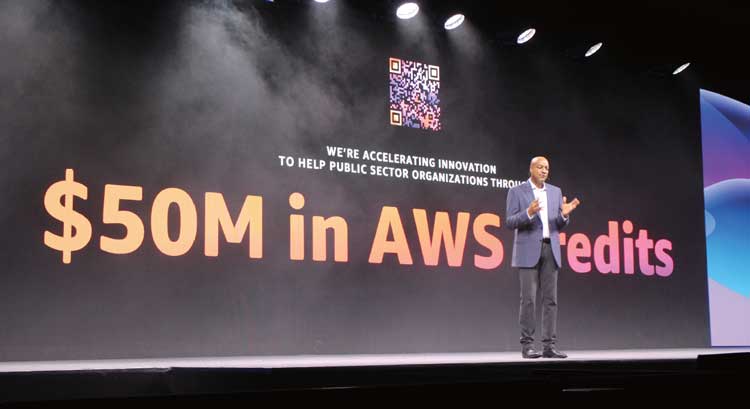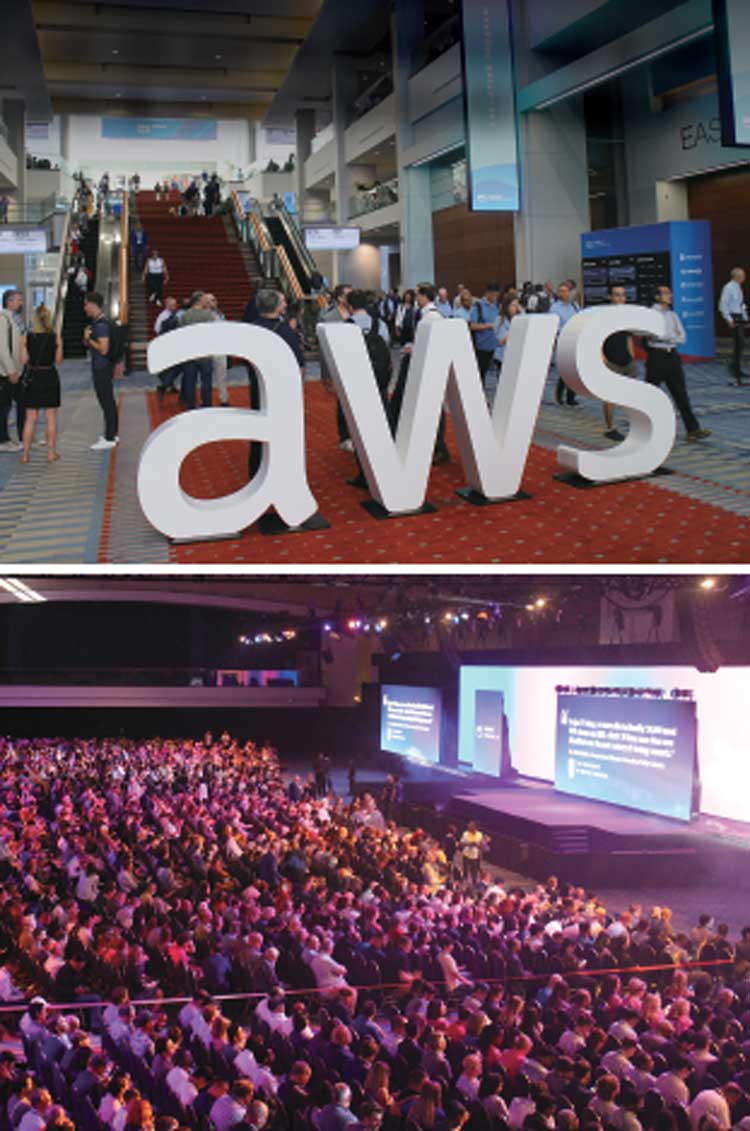Amazon's market cap surpassed $2 trillion for the first time. The British economic weekly magazine 'The Economist' reported that gifts were sent to Amazon, which celebrates its 30th anniversary on July 5th. The event hall gave a sense of the recent fever of generative AI innovation. Around 300 sessions were held simultaneously, and public sector cases of successful introduction of cloud-based generative AI were shared.

“Why does Amazon offer a public cloud?” (Audience)
“We live in a complex and conflict-ridden world, and at Amazon, we want to listen to everyone’s voice.” (Dave Levy, Vice President of AWS Public Sector)
On June 26 (local time), as the Amazon Web Services (AWS) global cloud forum, 'AWS Summit 2024', opened at the Walter E. Washington Convention Center in Washington D.C., a roar was suddenly heard from the audience of approximately 24,000 people. Dave Levy, Vice President of AWS Public Sector, announced the 'AWS Public Sector Generative AI Impact Initiative' that day, which will invest 50 million dollars (approximately 69.1 billion won) to help introduce generative AI in governments, non-profit organizations, educational institutions, medical institutions, and the aerospace sector, rather than private companies. Vice President Levy said, "Generative AI is a huge opportunity," and emphasized, "A solid foundation called the 'cloud' is important to seize this opportunity. (Public sector) leaders must recognize this huge movement and make the most of the benefits brought about by technological transformation."
On this day, Amazon's market cap surpassed $2 trillion (about 2,764 trillion won) for the first time. The British economic weekly 'The Economist' reported that gifts were flying into Amazon, which celebrated its 30th anniversary on July 5th. The analysis is that the market positively evaluated Amazon's journey of innovation relay, including e-book readers, smart speakers, video streaming services, self-driving car development, low-orbit communication satellite development, and cloud computing.

Generative AI is a huge opportunity… Sharing successful adoption stories everywhere
The event hall on that day gave a sense of the recent generative AI innovation fever. Around 300 sessions were held simultaneously, and public sector cases of successful introduction of cloud-based generative AI were shared.
The Halo Trust, a non-profit organization that clears landmines, said, “We are using generative AI to analyze drones and satellite images to create minefield maps and practically use them for mine clearance,” adding, “We are flying high-resolution drones to collect information all at once and helping to clear mines so that the land can be reused.” Senior Assistant Secretary of the Army Young Bang said, “The Army’s greatest resource is people, and we are also the biggest consumer of AI algorithms.” “Whether it’s weapons imports or technology introductions, when we make risk-based decisions, we use generative AI to help us identify risks before reporting them to higher-ups.”
The strengths of AWS's cloud-based public sector generative AI service are customization according to individual situations and strong security. For example, the generative AI secretary 'Amazon Q' service answers questions and generates necessary content based on data uploaded to each cloud. The company explains that this is a service that is especially necessary in the public sector, which is trying to take care of security issues, as data external leakage is almost impossible.
Interview Dario Amodei, CEO of Antropic:
“Differentiating from OpenAI with ‘Constitutional AI’… Democracy will be promoted”

Stanford University, Ph.D. in Computer Science, former Baidu, Google, OpenAI Photo Antropics
“We are different from OpenAI because we are implementing ‘Constitutional AI.’ We are setting the future direction of generative AI based on the UN Declaration of Human Rights, etc.”
Dario Amodei, CEO of Antropic, emphasized this at the 'AWS Summit 2024' held in Washington D.C. on June 27. He continued, "The goal is not simply to create a better LLM (Large Language Model), but to develop AI systems that allow people and software to collaborate in meaningful ways." Antropic is a startup founded in 2021 by siblings Daniela and Dario Amodei, who worked at OpenAI. The recently released Claude 3.5 Sonnet is evaluated to be superior to OpenAI's 'GPT-4o' in chart understanding and document understanding for performing multimodal (complex information processing) tasks. It has received about 4 billion dollars (about 5.5284 trillion won) in investment from Amazon so far. The following is a Q&A.
Why has the U.S. government recently become interested in AI companies?
“Entropic has a short history (3 years), but it has created a model with high capabilities and is strong in terms of safety and security compared to other companies. The government is curious about whether they can trust the answers provided by generative AI to politically sensitive questions. We said that we are applying ‘constitutional AI principles.’ This is a significant difference from OpenAI.”
How can ‘constitutional AI principles’ be realized?
“We design documents based on human values and ethics, such as the Constitution or the UN Declaration of Human Rights, to reflect social values and ethical standards in the process of AI learning or providing feedback. When generating text, we can filter out harmful or unpleasant content or set it to exclude unwanted topics or content. To do this, we conduct vulnerability tests quite a few times. We make the model itself recognize strange questions and not answer them. We test whether the model will yield or not when a criminal group such as a malicious hacker attempts to input data. In particular, since this year is an ‘election year,’ we conducted a lot of political vulnerability tests by outsourcing them to external parties.”
If you had any advice for public sector leaders considering adopting generative AI, what would it be?
“Government customers today are very interested in creating the future. If I were a government employee, I would start with a very simple point (introducing generative AI). It is a task that is constantly repeated, but is not simple enough to be easily automated, so it still requires human intervention. Let’s go back exactly two years ago. The parts that were thought to be impossible to automate at that time can now be automatically processed by generative AI. If you introduce generative AI when you want to quickly start a citizen service, you will be able to obtain powerful efficiency at low cost. If you change the parts that were difficult to do in the past, changes will occur on a large scale. There may be many concerns and worries, but the belief that AI can further enhance democracy is still valid.”
If we were to envision the future of generative AI in the public sector.
“I look forward to a future where citizens will quickly obtain most of their daily life information through AI chatbots. They will be able to access government services and interact with the government more quickly. I believe that AI will enhance democracy.”